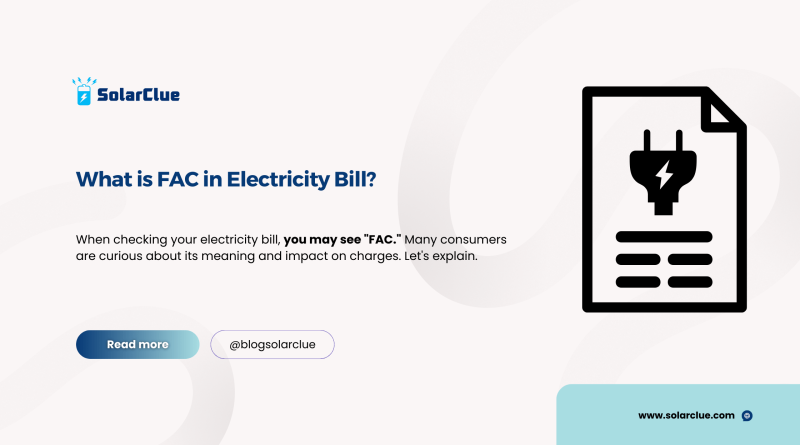What is FAC in Electricity Bill?
When reviewing your electricity bill, you might have come across the term “FAC.” Many consumers wonder what it stands for and how it affects their overall charges. Let’s break it down for you.
Table of Contents
What is FAC in Electricity Bill?
FAC stands for Fuel Adjustment Charge. It is a variable charge included in electricity bills to account for fluctuations in the cost of fuel required to generate electricity. Since fuel prices are not constant and can vary due to market conditions, these changes directly impact the cost of power generation.
Electricity providers use the FAC mechanism to adjust these costs periodically, ensuring that the burden of rising or falling fuel costs is distributed fairly among consumers.
Why is FAC Important?
Electricity generation relies heavily on fuel, such as coal, gas, or oil. When the cost of these fuels increases, power companies incur higher expenses to produce electricity. FAC allows utilities to recover these additional costs without seeking frequent tariff revisions.
How is FAC Calculated?
FAC is typically calculated based on:
1. Variation in Fuel Costs: The difference between the actual fuel cost and the cost assumed in the base tariff.
2. Units Consumed: FAC is charged per unit of electricity consumed.
3. Regulatory Approval: The calculation and application of FAC are overseen by state electricity regulatory commissions to ensure fairness and transparency.
Key Terms Related to FAC
FAC Rate: The amount charged per unit of electricity consumed, determined by the variation in fuel prices.
FAC Cap: Some states impose a cap on the maximum FAC rate to protect consumers from sudden price surges.
Impact of FAC on Your Bill
The FAC component can increase or decrease your electricity bill depending on fuel price trends. For instance:
When fuel costs rise: You’ll see a higher FAC charge in your bill.
When fuel costs drop: The FAC charge reduces, reflecting savings.
What Can Consumers Do?
While you can’t avoid paying FAC, understanding its role in your electricity bill helps you plan your energy expenses better. Here are a few tips to manage electricity costs:
1. Reduce Consumption: Adopt energy-efficient practices to lower overall usage.
2. Monitor Bills: Keep track of FAC changes to understand market trends.
3. Consider Solar Power: Installing solar panels can help you reduce dependency on grid electricity and avoid variable charges like FAC.
Conclusion
FAC ensures that electricity providers recover fuel cost fluctuations in a fair and transparent manner. Although it may increase your bill during periods of high fuel prices, it also decreases when fuel costs drop, balancing the overall impact.
Looking for a way to reduce electricity costs and avoid fluctuating charges like FAC?
Explore solar solutions with SolarClue. With solar power, you can take control of your energy expenses and contribute to a greener future. 🌞




